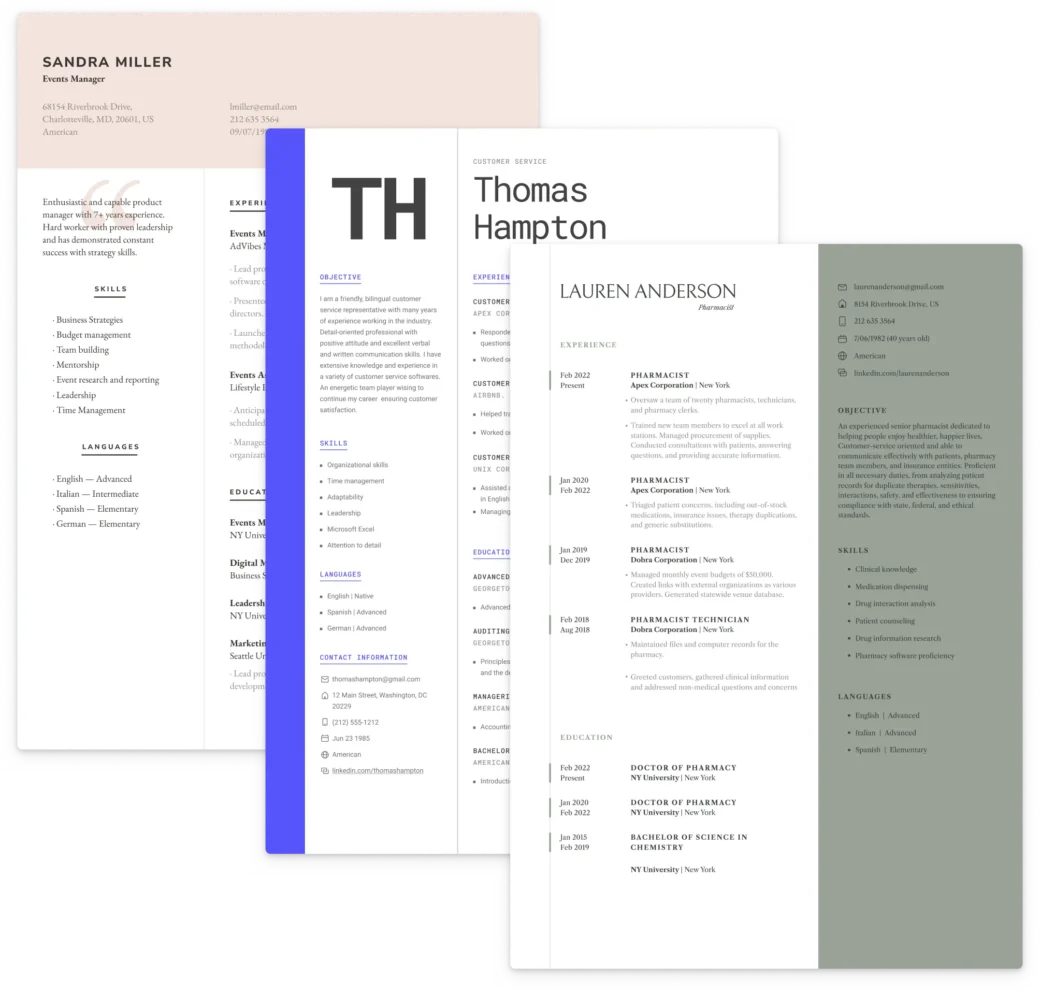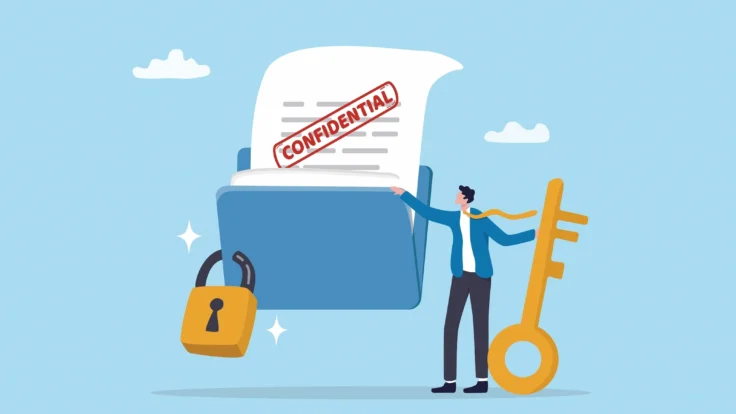We are all familiar with doctor-patient and attorney-client privilege, but is confidentiality on a resume actually a thing?
It is!
We’ll explain here how you can tweak your resume to fit the format of a confidential resume. Later, our AI resume builder can help you put together your professional document.
When or Why You Might Need a Confidential Resume
Are resumes supposed to be confidential? Not always, but there are some reasons why you would use a confidential resume. These could include:
- You’re applying for sensitive positions: If you are applying for an executive or high-level law enforcement role, privacy can be critical.
- You’re currently employed: Using a confidential resume helps protect your current position while exploring new opportunities.
- You’re a public figure: A confidential resume helps you avoid drawing media or public attention to your job search.
- You want to limit recruiter contact: This type of resume lets you filter legitimate interest and avoid spam.
How To Write a Confidential Resume
A confidential resume looks exactly like any resume, except you may choose not to list your name, personal information, dates, or the names of past employers. Below, we break down how to do this correctly.
1. Add a title and contact information
Instead of writing your name in the heading on a confidential resume, you might put “Confidential Candidate,” a professional title, or use a pseudonym. Then, you can write your city and state, and as is best practice anyway, omit your street address. Unless working with an executive headhunter, always list your contact email so the recruiter can reach out to you.
2. Include a generic company description and job title
If you cannot list the name of the company you worked for in your Work History section due to confidentiality agreements, you can write a generic description of it instead.
For example: Fortune 500 tech company
Follow that with your job title, the dates you worked there, and bullet points that highlight your major accomplishments or responsibilities.
Jobs should be listed in chronological order, just as in a standard resume.
3. Add your education section
In the Education section, you can choose to leave out the dates that you gained your degree or diploma, as it can lead to age discrimination. In the US, the Age Discrimination in Employment Act (ADEA) is there to protect workers over the age of 40 from discrimination. However, if in doubt, do not list any dates that might indicate your age.

Build your perfect resume with ease
Craft the perfect resume effortlessly with our builder. Get started today!
Example confidential resume
Here’s an example of a confidential resume that leaves out personal information or information that cannot be listed due to confidentiality agreements.
Dates are included in our example; however, you can choose not to add them if you wish to remove any indicators of your age.
[Marketing Management Professional]
[Berkeley, CA]
[(973) 222-5555 | name@randomemail.com]
Summary
Marketing leader with proven success in driving sales, productivity, and market share. Drove 30% increase in revenue, 38% increase in production, and 55% improvement in search engine results. Led 7-figure marketing campaigns for several Fortune 500 companies, specializing in brand messaging, digital marketing, and content creation.
Skills
- Strategic planning
- Digital: SEO, PPC, SEM
- Data Analysis: Google Analytics, Google Data Studio, Hootsuite Insights, SEMrush, HubSpot
- Team leadership
- Budget management: SAP Concur, spreadsheet proficiency, Qlik
Experience
President of Marketing
11/2021 – present
Market-leading digital solutions company
- Managed marketing teams to create effective multichannel marketing strategies used to drive a 22% growth in revenue and brand recognition.
- Led a cross-functional marketing team of 12 to execute a targeted campaign redesign, resulting in a 35% increase in online sales during Q2–Q4 2022.
- Implemented a data-driven SEO and content strategy that improved company website traffic by 40%, with a 58% increase in click-through rates.
- Launched a customer segmentation and email automation initiative that increased revenue by $480,000 in fiscal year 2023 and $550,000 in 2024.
Vice President of Marketing
01/2021 – 10/2023
A fast-growing SaaS company serving mid-market and enterprise clients.
- Launched a multi-channel campaign strategy that increased qualified B2B leads by 47% in under 12 months.
- Rebranded the company and optimized messaging, contributing to a 22% improvement in brand recall and awareness.
- Reduced customer acquisition cost (CAC) by 30% by simplifying ad spending and refining targeting across digital platforms.
Senior Marketing Director
06/2020 – 12/2021
Industry leader specializing in digital transformation and enterprise solutions.
- Grew inbound marketing-generated revenue by $1.2M within 18 months through SEO, content, and automation.
- Increased campaign conversion rates by 38% by implementing A/B testing and real-time personalization tools.
- Led a cross-functional team in launching a product refresh that drove a 29% boost in upsell revenue.
Education
- Master of Business Administration | State University
- BA Marketing | State University
Confidential Resumes and NDAs
Non-disclosure agreements (NDAs) between you and an employer generally prohibit you from discussing all or some of your work that may involve trade secrets, technologies, patents, or anything your company uses as an advantage over competitors.
This could also include project or responsibility details, names of clients, and even information about upcoming or unreleased projects.
💡Important:
Review your NDA for exact terminology so you know what you can and can’t reveal on a confidential resume. Be clear about how the NDA defines confidential information, what is excluded from this information, and your specific obligations regarding the agreement.
Here is an example of how to put NDA work on a resume:
Experience
Technical Writer
US Government Agency
09/2022 – 10/2023
- Researched, developed, and wrote 2 manuals for proprietary software programs for government clients (subject to NDA, no further details available).
How many details you can add, such as your specific role, use of absolute numbers (for example, “led to $5M increase in revenue” or “decreased corporate spending by 10%”), or even the name of the client you worked for, would be subject to the terms of your particular NDA.
If you need assistance writing about your relevant experience according to your NDA criteria, our resume builder has integrated AI, which can help you write these bullet points.
💡top tip
If you’re adding a link to a public profile to your resume, be sure that privacy settings are enabled. For LinkedIn, this includes turning off activity broadcasts and selecting who can view your connections under Privacy & Settings/Profile and Account tabs.
Confidential Resume: Pros and Cons
As we’ve touched upon, the biggest pros of using a confidential resume are to maintain your privacy and minimize any risk of your current employer finding out that you’re seeking a new job.
A confidential resume also removes the possibility of bias during the screening process and protects your personal information.
It also protects you if you signed an NDA with a past employer, saving you legal headaches.
Along with the positives, of course, come a few cons of using a confidential resume:
- Potential employers may question why you’re being secretive or withholding information
- Recruiters and hiring managers may look more favorably at detailed resumes
- Candidates using confidential resumes may be seen as less credible than those who disclose information
- Confidential resumes could hurt one’s chances of building trust with a potential employer
Additionally, the onus is on the candidate to prove their past successes without mentioning specific financial or personal details. In the long run, this could be detrimental as companies might look to other candidates who freely discuss details of their work experiences and accomplishments.
Candidates using confidential resumes also need to be careful of their wording, especially in regard to NDAs. This might cause some added stress to job searches, which could already be somewhat stressful and uncertain.
Thus, one should consider all of these factors before deciding to utilize the confidential resume format.
Should You Use a Confidential Resume?
It is entirely reasonable to feel that maintaining privacy during many activities, including job searching, is an important habit to follow.
A confidential resume is an acceptable way to maintain your privacy while showcasing your value to potential employers. For the most part, employers understand this need for privacy, particularly in cases where candidates wish to keep their job search discreet while they are currently employed.
For example, if you are applying for a role as a company president or an important role in government.
Weigh these benefits and risks and decide what works best for your current situation. In the end, your value and achievements should still stand out on a confidential resume despite some details being omitted.
By writing your resume in this fashion, you are having an employer focus solely on your skills, relevant experience, and achievements that you can share with data that does not mention any confidential details.
Related Posts


